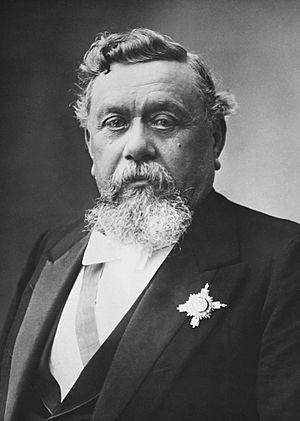Armand Fallières facts for kids
Quick facts for kids
Armand Fallières
|
|
|---|---|

Fallières in 1906
|
|
| President of France | |
| In office 18 February 1906 – 18 February 1913 |
|
| Prime Minister | Maurice Rouvier Ferdinand Sarrien Georges Clemenceau Aristide Briand Ernest Monis Joseph Caillaux Raymond Poincaré Aristide Briand |
| Preceded by | Émile Loubet |
| Succeeded by | Raymond Poincaré |
| Prime Minister of France | |
| In office 29 January 1883 – 21 February 1883 |
|
| President | Jules Grévy |
| Preceded by | Charles Duclerc |
| Succeeded by | Jules Ferry |
| Personal details | |
| Born | 6 November 1841 Mézin, France |
| Died | 22 June 1931 (aged 89) Lannes, France |
| Political party | Democratic Republican Alliance |
| Alma mater | University of Paris |
Clément Armand Fallières (born 6 November 1841 – died 22 June 1931) was an important French politician. He served as the President of France from 1906 to 1913.
Contents
Early Life and First Steps in Politics
Armand Fallières was born in a town called Mézin in the Lot-et-Garonne area of France. His father worked as a clerk. Armand studied law and became a lawyer in Nérac.
He started his public career in Nérac. In 1868, he became a town councilor. Then, in 1871, he became the mayor. He also served as a general councilor for the Lot-et-Garonne region that same year. Fallières was a strong supporter of the Republic, which means he believed France should be a republic, not a monarchy. Because of his beliefs, he lost his position in May 1873 when the government changed.
However, in February 1876, he was elected as a deputy for Nérac. A deputy is like a representative in the government. He joined a group of Republicans in the Chamber of Deputies. He signed an important protest in May 1877 and was re-elected five months later.
In 1880, he became an under-secretary in the Ministry of the Interior. This is a government department that deals with internal affairs. He held this role until November 1881. From August 1882 to February 1883, he was the Minister of the Interior. For about a month, starting in January 1883, he also served as the Prime Minister. During his time as Prime Minister, his government had to decide what to do about people who claimed they should be the king of France.
Becoming a Leader
Armand Fallières was not well at the time. He found it hard to deal with the strong disagreement from others. He resigned when the Senate (another part of the French government) did not agree with his plans.
However, in November of that same year, he was chosen as the Minister of Public Instruction by Jules Ferry. This role meant he was in charge of education. He made several important changes to the school system.
He resigned from this role in March 1885. Two years later, he became the Minister of the Interior again in a new government. In December, he changed his role to become the Minister of Justice. He returned to the Ministry of the Interior in February 1889. Finally, he took on the role of Minister of Justice again from March 1890 to February 1892.
In June 1890, his home region of Lot-et-Garonne elected him to the Senate. In the Senate, Fallières stayed mostly independent of the different political groups. However, he kept his influence among the Republicans.
In March 1899, he was elected President of the Senate. He held this important position until January 1906. At that time, different groups from the Left in both parts of the government chose him as their candidate for President of the Republic. He won the election on the very first try. He received 449 votes, while his opponent, Paul Doumer, received 371 votes.
As President, Fallières was openly against the death penalty. He changed the sentences of many prisoners who had been sentenced to death, saving their lives.
Awards and Honors
Armand Fallières received many important awards and honors from different countries:
 Spain: Grand Cross of the Royal and Distinguished Order of Charles III, with Collar, in 1905.
Spain: Grand Cross of the Royal and Distinguished Order of Charles III, with Collar, in 1905. Sweden: Knight of the Royal Order of the Seraphim, in 1906.
Sweden: Knight of the Royal Order of the Seraphim, in 1906. Norway: Grand Cross of the Royal Norwegian Order of Saint Olav, with Collar, in 1906.
Norway: Grand Cross of the Royal Norwegian Order of Saint Olav, with Collar, in 1906. Siam: Knight of the Order of the Royal House of Chakri, in 1907.
Siam: Knight of the Order of the Royal House of Chakri, in 1907. Kingdom of Romania: Collar of the Order of Carol I, in 1907.
Kingdom of Romania: Collar of the Order of Carol I, in 1907. United Kingdom: Royal Victorian Chain, in 1908.
United Kingdom: Royal Victorian Chain, in 1908. Kingdom of Italy: Knight of the Supreme Order of the Most Holy Annunciation, in 1909.
Kingdom of Italy: Knight of the Supreme Order of the Most Holy Annunciation, in 1909. Monaco: Grand Cross of the Order of Saint-Charles, in 1909.
Monaco: Grand Cross of the Order of Saint-Charles, in 1909.
Images for kids
See also
 In Spanish: Armand Fallières para niños
In Spanish: Armand Fallières para niños
 | Bayard Rustin |
 | Jeannette Carter |
 | Jeremiah A. Brown |


